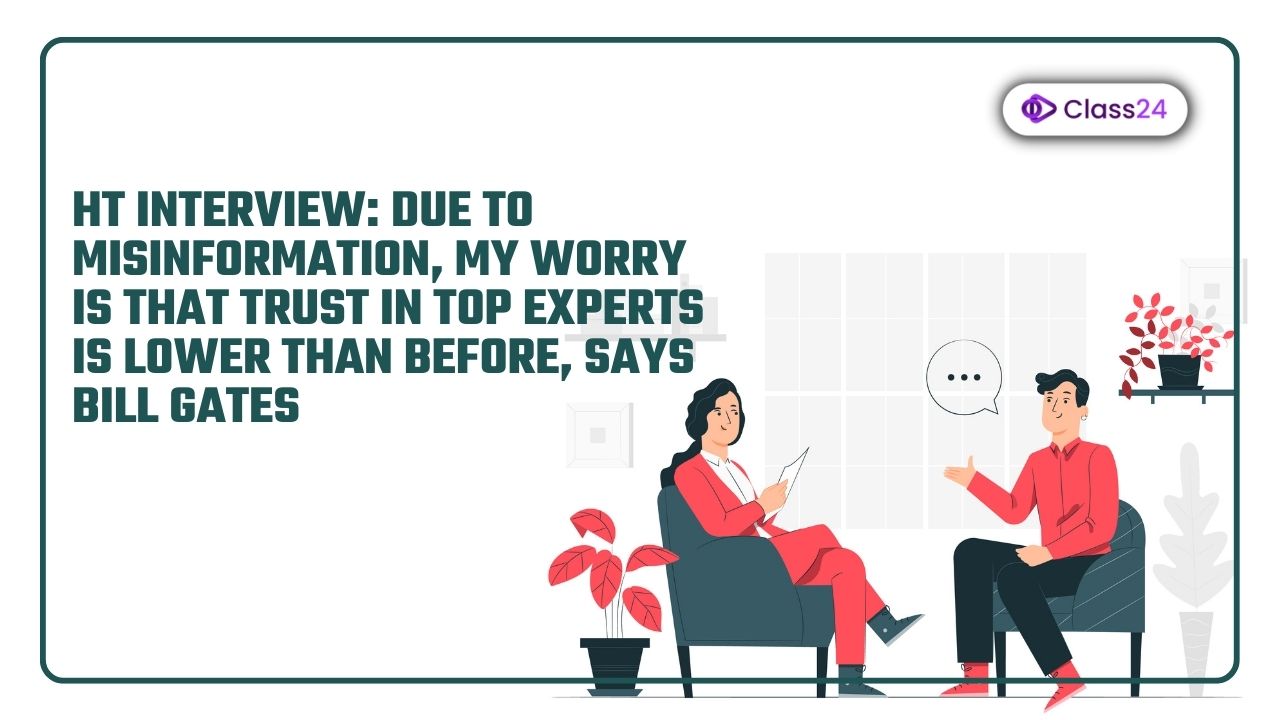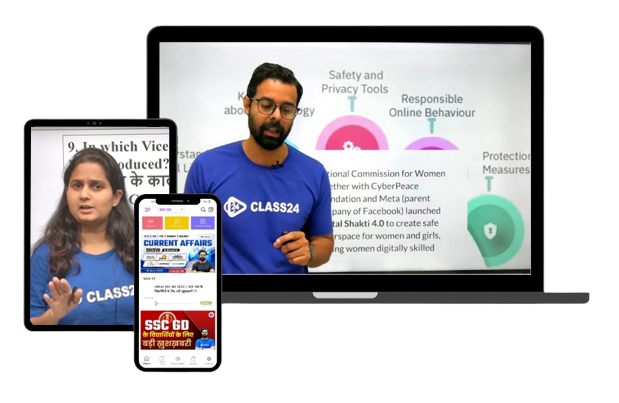Daily Quizzes
Mock Tests
No tests attempted yet.
Select Category
HT Interview: Due to misinformation, my worry is that trust in top experts is lower than before, says Bill Gates

To Prime Minister Modi’s credit, when we were doing the 2015 Paris Accord where people signed up for various commitments, part of the reason he went to it was because of a side meeting that he named “Mission Innovation”, Bill Gates says.
.png)
The world can learn from the digital systems India has created for health care, Bill Gates says, describing as incredible the country’s vaccination campaign and the scale of the challenge it tackled. Gates, co-founder of Microsoft and the co-chair of the Bill & Melinda Gates Foundation, also touched upon climate and the future of technology in an interview to HT. He said he sees innovation as key to fighting global warming, and the recent breakthroughs in artificial intelligence as making a big impact in the health and education sectors.
I’m going to start with a fairly obvious question: Covid — do you think it’s over? We do know that there are still cases all over the world. But do you think the worst of it is over?
Yes, the world has chosen to go back to big public events and offices. It’s essentially a disease of older people or people with an immune deficit. And so, those people will have to be very careful in keeping their vaccinations up to date or avoiding exposure. We see that natural immunity fades and so does vaccine immunity with most of our available vaccines. So, trying to get the elderly or people with health conditions to maintain their vaccine coverage — countries need help with that. The booster adoption in the United States is, like, 30%.
It’s far lower in India…
Countries need to do an even better job with that…; unless a variant comes along that surprises us, and the probability of that is viewed as quite low, we’re out of the acute phase, and it’ll be out there like flu and other diseases.
You’ve been speaking to a lot of people in various countries. Have there been any fundamental changes in how governments respond to a public health crisis like this, so we will be better prepared the next time something like this comes?
Well, we’ll certainly be prepared as we should be. Still, things got balanced very quickly after the pandemic. The Ukraine war, and now we have a turn in the economic cycle where global interest rates are starting to go up – so there’s a lot of distraction. That’s why we have meetings, like G20, G7, and one of the topics is, do we have to wait for a second pandemic before we get our act together?
I’m very pleased to see that India has a One Health initiative that says we’ve got to track what’s going on in the animal world. I’ve had good discussions on what’s called environmental surveillance, where you’re going to the sewage stream. And you can see not just Covid, but also flu variants there. The [Bill and Melinda Gates] foundation is working to get the cost of that down, so that it can be done on an ongoing basis. And that should be a basic system for the world to adopt.
In my book, I have called for a few investments, including strengthening the World Health Organization. The jury is still out on whether we’ll [be able to] do that. In the meantime, there’s a lot of great work on making diagnostics easier and cheaper.
On vaccines, they are very protective but we need to fix that they don’t block you from getting infected.
Then come questions like whether we should have [vaccine] factories on standby? What does that look like? How expensive is that? A lot is still to be discussed.
But one of the things that rose during the pandemic – it was always around, and people sort of lived with it – was the amount of disinformation that was out there. How do you deal with something like that ?
Well, I was perhaps naïve; believing that once we got these digital communication systems, that human rationality would take over. The fact is that people were interested in simplistic explanations, that there was one person behind it. The scale of those false messages – some of those conspiracy theories focused on me too – have reduced as we’ve gotten out of the acute phase of the pandemic but some people were never vaccinated, some never used masks, and those would have been very protective for them. Sadly, a tiny bit of that vaccine controversy has now attached itself to non-Covid vaccines. Vaccines are a miracle to human health when you look at why we have cut child deaths by half. I worry that the trust in experts, particularly medical experts, is a little bit lower than it was before we went into the pandemic.
India doesn’t really have a hesitancy problem. People here are fairly adoptive of vaccines.
It’s incredible. Compared to even the richest countries, India did a very good job on vaccination. And there might be one or two countries that did better, but it’s amazing, nobody would have expected that. The digitisation of the system was effective; the public communication was quite effective. Of course, vaccine manufacturers were our partners in terms of adding new vaccines, getting prices down, and we have worked with all of them.
You spoke of digitisation. And one of the things that we saw was this rapid acceleration of it. Do you think those gains are permanent, not just in India, but elsewhere in the world? I’m sure the same kind of jump happened in many countries.
Not as much as in India. With the breadth of talent, the scale, if you’re going to track vaccination for these many people, a digital system was the only way to do that. I was in the health ministry and they were showing how they did that with a digital system. That is something we want to have people from other countries to come and see.
Using digitisation, the government is working to raise the quality of the health system under the ABDM (Ayushman Bharat Digital Mission) umbrella.
Taking both the approach and some of the specific software to other countries is a key strategy, just like it is for financial services. We got IIIT Bangalore to build an Aadhar-type open source identity system and they’re working with 10 countries who have shown interest already. And with this G20 visibility, I’ll bet that will go up to 20 or more.
Jumping tracks now; we had our hottest February in 122 years. It is likely to be hot again this year, and this has been happening over the past decade. It’s clear that whatever models we had for the climate crisis pretty much underestimated the extent of the problem. And we’ve been seeing what happens at each one of the UN climate conferences and there are still a lot of unresolved issues between countries. What should change?
Well, the right paradigm on this is that let’s just talk mitigation. The clean approaches are, in some cases, very very expensive: for cement, more than double; for aviation fuel, more than double. Hence, you could say that rich countries should subsidise that but that would be literally trillions of dollars. And even if it should happen, it’s not going to happen. Total aid from rich countries is little under $200 billion a year and politically there is no significant upside to that.
And yet, to say to India and others, slow down your development by using expensive cement where you’re just providing basic shelter, where you’re not responsible for the historic emissions that are causing most of that warming – that’s not going to work either. Hence, you square it through innovation where you make the green approach cost no more than the current approach, which I call the green premium getting to zero.
To Prime Minister Modi’s credit, when we were doing the 2015 Paris Accord where people signed up for various commitments, part of the reason he went to it was because of a side meeting that he named “Mission Innovation”. There, he said raise the R&D budgets, get private sector to invest in these high-risk companies. And I was the host saying, okay, we’ll get the private sector going, I created Breakthrough Energy out of that. Now, eight years later, that there’s over 100 companies we’ve invested in and, say, another 100 that are really also doing great work.
[But] the near-term figures of those annual [climate] meetings are depressing because the Ukraine war has forced more coal use, and slowed down coal retirement.
Making sure Ukraine isn’t destroyed is also a priority, [so is]making sure Europe can keep its jobs and keep people warm in the winter — the world has to deal with a lot. Climate is important. The only reason I’m optimistic is because of the pace of innovation.
There’s also an accompanying food crisis in many countries, especially in the Global South. Last year, for instance, India’s wheat crop was hit because of the early summer. What do you see happening in the realm of innovation in this area, which can help address this?
Yes, so it might not be very visible that the second biggest area for the Gates Foundation, after our health work, which is by far the biggest, is our work in agriculture. We fund a lot of work, including this global system called the CGIAR (Consultative Group on International Agricultural Research), the seed innovation system. Fortunately, the good news is that [compared to] the kind of thing that happened during the Green Revolution, which helped avoid malnutrition and starvation, particularly in India, Pakistan, and Bangladesh, we can go much further.
I was at the biggest Indian agricultural site yesterday, at ICAR at Pusa institute. Some of that is funded by our foundation and some of the innovation they are just doing on their own is quite impressive. But of all the climate adaptation things that are urgent, agriculture is one and we’re still not spending enough on agricultural productivity.
I think there’s some level of consensus now that 2022 was certainly important year for artificial intelligence. I mean, especially with ChatGPT and before that Lambda becoming the first two to pass the Turing test. Do you think this is sort of going to be the next phase of technological revolution for us?
Absolutely. This AI has been having a big impact, because things like recognising pictures or recording, in interpreting speech or synthesised speech, a lot of these AI systems were doing well. The thing they could not do is read, and not understand complex questions. So, they could read a document and answer those questions – but they couldn’t write. And what we’re seeing from many companies, but in particular, from the OpenAI-Microsoft collaboration, and there’s things even better than the current ChatGPT that is being incorporated say into Bing under, Satya’s (Nadella) leadership, it’s amazing. Now, as you play with it, sometimes it’s amazingly bad. But other times, it’s amazingly good. So, this will be a tool, and for me, a lot of the focus is how do we take this tool into health, where we don’t have enough doctors? How do we take this tool into education? Where if we could reduce class size, or we could have a tutor after school that’s helping the kid who’s behind. I do believe, specifically, this technology, and Microsoft has been super helpful in making sure it’s used in these areas; I think it can make a huge difference. And it’s going to get better pretty quickly. It’s for a good reason that governments and companies are looking at what this means.
Hindustan Times
( International )




